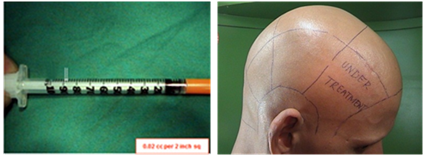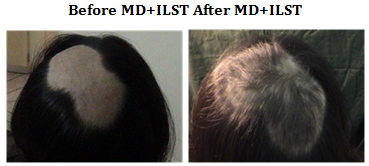Journal of
eISSN: 2574-9943


Case Report Volume 2 Issue 1
Consultant dermatologist, Alhamd Skin Clinic, Pakistan
Correspondence: M Iftikhar Sheikh, Consultant dermatologist, Alhamd Skin Clinic, Tel +923009423032, Pakistan, Tel 923000000000
Received: December 08, 2017 | Published: February 8, 2018
Citation: Sheikh MI. A new combination therapy for scalp alopecia areata: a study of high negative pressure microdermabrasion + intralesional steroids. J Dermat Cosmetol. 2018;2(1):38-40. DOI: 10.15406/jdc.2018.02.00035
Alopecia Areata (AA) is an auto immune disorder1 of hair bearing areas of the skin. The incidence of alopecia areata has been increasing over the last few years. This condition affects 0.1-0.2%2 of humans, occurring in both men and women. AA occurs in people who are apparently healthy and have no existing skin disorders. Different regimens are already in practice including local irritants such as capsicum lotion, topical steroids, and oral immuno suppressants, oral and injectable steroids. Hair regrowth results are variable, either uniform or like bushes, and recurrence is very common.
This paper aims to present a study of a relatively new combination procedure to treat AA. In our study we combined high negative pressure microdermabrasion (MD) with intra lesional steroid (ILST) injection. We compared the results of this combination with ILST alone also.
Keywords: alopecia areata, microdermabrasion, intralesional steroid, aluminium oxide crystals, exclamation marks
MD, microdermabrasion; ILST, intra lesional steroid
In AA the affected skin usually appears like smooth bald skin spots (spot baldness) which may show broken hair known as short stubs (exclamation marks).3 In this combination therapy, during each session MD was carried out followed by ILST.
Microdermabrasion can result in
The ILST: This provides immunosuppression 4-6 and is given in a dose according to the area of scalp involved.
This combination therapy of MD followed by ILST constituted one session. Each patient had 6 sessions every 15-20 days. MD was performed with aluminium oxide crystals with a specially designed hand piece (made in Pakistan) that had a wide hole at its tip, suctioning almost 1cm square chunk of skin and shot a crystal jet in a fan like movement abrading a fine layer of skin. The wide bore tip of hand piece of MD machine moved linearly over AA area of scalp at slow speed with high negative pressure (Figure 1).
This was followed by injection of 0.02cc (0.8mg) of undiluted ILST to an approximately 2 inch square area or AA on the scalp with 30G needle (Figure 2).

Figure 1 The specially designed hand piece for MD, with wide hole at tip, suctioning almost 1cm square chunk of skin due to high negative pressure and abrading fine layer of skin by shooting crystal and producing very affective skin irritation.

Figure 2 The syringe shows the amount of undiluted ILST between 2 adjasent white arrows, and the scalp shows the area of AA divided into 2” square boxes. 0.02cc (0.8mg) of ILST is given into the center of each square.
Inclusion criteria
Exclusion criteria
Pre-procedure
So a study of this combination was done in 70 patients, in both sexes, in different age groups from January 2013 to January 2016. A comparison was also done with ILST alone (Table 1).
Study Period Proposed 3 Year |
From January 2013 to January 2016, Follow Up Continued to Date |
Total number of patient 70 |
50 patients treated with combination of MD+ILST |
Males 45 female 25 |
20 patients treated with ILST alone |
Age 5-50 years |
Mean age 20 years |
Treatment duration 3-5 months |
Mean treatment duration 4 months |
Each patient had six sessions every 15 to 20 days. |
|
Table 1 This table shows the study protocol.
With our combination treatment (MD+ILST), all patients had remarkable improvement. Hair regrowth was usually obvious after third or fourth session. There was usually enough growth in 5-6 sessions. The regrowth of hair was fast full and very uniform (Figure 3).

Figure 3 The combination of MD+ILST gives uniform and full growth (after 4th Session).
With ILST alone the growth was slower, less uniform, like bushes, unevenly distributed, with areas of no grow.
With ILST alone the growth was slower, less uniform, like bushes, unevenly distributed, with areas of no grow (Figures 4&5).
We proposed result criteria as following
Our results of MD + ILST for the 50 patients were
Recurrence rate after stopping treatment
Recurrence for all 50 patients (MD+ILST) |
||
After 4-6 months |
After 6-12 months |
After 12-24 months |
5 Patients (10%) |
9 Patients (18%) |
12 Patients (24%) |
Our results indicate that MD+ILST are safe and very effective treatment for AA . MD produces controlled irritation of bald skin, suctioned follicular plugs, improved blood flow and enabled uniform distribution of ILST. The ILST provides immunosuppression. The recurrence rate after stopping treatment is from 10-24% from 6 months to 24 months.
Special thanks to Shehla Bajwa, Rabia Nisar and Zainab Nisar for their untiring efforts in making this study.
There is no conflict of interest and no financial assistance.

©2018 Sheikh. This is an open access article distributed under the terms of the, which permits unrestricted use, distribution, and build upon your work non-commercially.